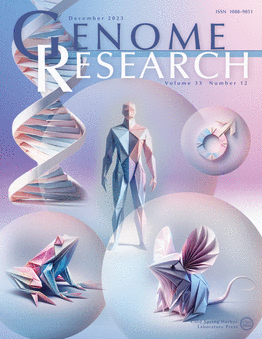利用孟德尔随机化框架进行遗传学驱动的风险预测
IF 6.2
2区 生物学
Q1 BIOCHEMISTRY & MOLECULAR BIOLOGY
引用次数: 0
摘要
未来疾病发病的准确预测模型对于有效的预防保健至关重要,然而将早期风险因素与后续健康结果联系起来的纵向数据集却很有限。为了克服这一挑战,我们引入了一个新颖的框架--使用孟德尔随机化的风险预测建模(PRiMeR),它利用遗传效应作为监督信号来学习疾病风险预测因子,而无需依赖纵向数据。为此,PRiMeR 利用了健康人群的风险因素和遗传数据,以及相关疾病的全基因组关联研究结果。经过训练后,学习到的预测因子可用于仅根据风险因素评估新患者的风险。我们通过综合模拟验证了 PRiMeR,并利用随访发病标签对英国生物库中未患糖尿病的参与者进行了未来 2 型糖尿病预测验证。此外,我们还将 PRiMeR 应用于根据脑成像生物标记预测阿尔茨海默病的未来发病情况,以及根据加速度计衍生特征预测帕金森病的未来发病情况。总之,通过 PRiMeR,我们为预测建模提供了一个新的视角,表明利用遗传学而不是纵向数据学习风险预测因子是可行的。本文章由计算机程序翻译,如有差异,请以英文原文为准。
Genetics-driven risk predictions leveraging the Mendelian randomization framework
Accurate predictive models of future disease onset are crucial for effective preventive healthcare, yet longitudinal data sets linking early risk factors to subsequent health outcomes are limited. To overcome this challenge, we introduce a novel framework, Predictive Risk modeling using Mendelian Randomization (PRiMeR), which utilizes genetic effects as supervisory signals to learn disease risk predictors without relying on longitudinal data. To do so, PRiMeR leverages risk factors and genetic data from a healthy cohort, along with results from genome-wide association studies of diseases of interest. After training, the learned predictor can be used to assess risk for new patients solely based on risk factors. We validate PRiMeR through comprehensive simulations and in future type 2 diabetes predictions in UK Biobank participants without diabetes, using follow-up onset labels for validation. Moreover, we apply PRiMeR to predict future Alzheimer's disease onset from brain imaging biomarkers and future Parkinson's disease onset from accelerometer-derived traits. Overall, with PRiMeR we offer a new perspective in predictive modeling, showing it is possible to learn risk predictors leveraging genetics rather than longitudinal data.
求助全文
通过发布文献求助,成功后即可免费获取论文全文。
去求助
来源期刊

Genome research
生物-生化与分子生物学
CiteScore
12.40
自引率
1.40%
发文量
140
审稿时长
6 months
期刊介绍:
Launched in 1995, Genome Research is an international, continuously published, peer-reviewed journal that focuses on research that provides novel insights into the genome biology of all organisms, including advances in genomic medicine.
Among the topics considered by the journal are genome structure and function, comparative genomics, molecular evolution, genome-scale quantitative and population genetics, proteomics, epigenomics, and systems biology. The journal also features exciting gene discoveries and reports of cutting-edge computational biology and high-throughput methodologies.
New data in these areas are published as research papers, or methods and resource reports that provide novel information on technologies or tools that will be of interest to a broad readership. Complete data sets are presented electronically on the journal''s web site where appropriate. The journal also provides Reviews, Perspectives, and Insight/Outlook articles, which present commentary on the latest advances published both here and elsewhere, placing such progress in its broader biological context.
 求助内容:
求助内容: 应助结果提醒方式:
应助结果提醒方式:


